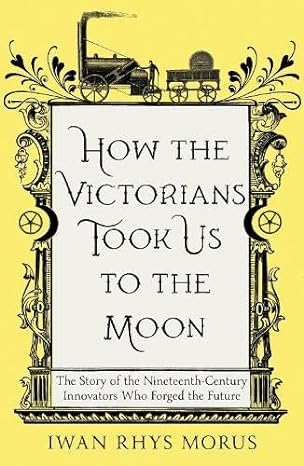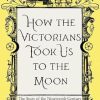How the Victorians Took Us to the Moon: The Story of the Nineteenth-Century Innovators Who Forged the Future
£10.60£11.40 (-7%)
‘[An] insightful analysis of 19th-century futurism … Morus’s account is as much a cautionary tale as a flag-waving celebration.’ – DUNCAN BELL, NEW STATESMAN
‘[How the Victorians Took Us to the Moon] rattles thrillingly through such developments as the Transatlantic telegraph cable, the steam locomotive and electric power and recalls the excitable predictions of the fiction of the time.’ KATY GUEST, THE GUARDIAN
‘Excellent … A terrific insight into why the Victorian era was a golden age of engineering.’ – NICK SMITH, ENGINEERING AND TECHNOLOGY MAGAZINE
By the end of the Victorian era, the world had changed irrevocably. The speed of the technological development brought about between 1800 and 1900 was completely unprecedented in human history. And as the Victorians looked to the skies and beyond as the next frontier to be explored and conquered, they were inventing, shaping and moulding the very idea of the future.
To get us to this future, the Victorians created a new way of ordering and transforming nature, built on grand designs and the mass-mobilisation of the resources of Empire – and they revolutionised science in the process.
In this rich and absorbing book, distinguished historian of science Iwan Rhys Morus tells the story of how this future was made. From Charles Babbage’s dream of mechanising mathematics to Isambard Kingdom Brunel’s tunnel beneath the Thames, from George Cayley’s fantasies of powered flight to Nikola Tesla’s visions of an electrical world, this is a story of towering personalities, clashing ambitions, furious rivalries and conflicting cultures – a vibrant tapestry of remarkable lives that transformed the world and ultimately took us to the Moon.
Read more
Additional information
| Publisher | Icon Books (9 Nov. 2023) |
|---|---|
| Language | English |
| Paperback | 352 pages |
| ISBN-10 | 1837731020 |
| ISBN-13 | 978-1837731022 |




by Brian Clegg
Despite beginning and ending his book with a tale of a Victorian moonshot, Iwan Rhys Morus is not writing steam punk fiction here, but rather exploring the nature of the Victorian scientific and engineering mentality, particularly in the UK, and how that made a huge transformation possible and has continued to influence the way we do some things, up to and including the Apollo programme.
Rhys Morus goes on give us stories of the development of everything from steam railways to the telegraph, from the transformation of electricity into the power source of the world to powered flight. Many of the characters we meet will be familiar – names such as Brunel, Stephenson, Faraday (anything but typical in personality of the kind of inventor Rhys Morus is focussing on), Babbage, Edison (less than I’d perhaps expect), the Wright brothers and many more. But there are also the less familiar, for example those involved in developing and laying the transatlantic cable, an epic boys-own story of failure transformed into eventual success.
We also get a useful contrast between the often wealthy inventors and the working people who made their inventions come to life. Stories of hardship and skill in, for example, digging Victorian tunnels have often been heard before, but we also see, for example, a dispute between Babbage and the craftsman who built the constructed part of the Difference Engine, who claimed ownership of the specialist tools he developed, where Babbage believed, as it was his idea, they should be his. And another very strong thread is the connection between Victorian invention and technology and empire. Rhys Morus makes it clear that he does not approve the imperial links – though it would have been interesting to explore whether we would have the science and technology we enjoy today without this being the case.
Sometimes, Rhys Morus does suffer from the enthusiast’s habit of giving too much detail about things that don’t really carry the story forward – naming too many bit part players, for example – while the underlying theme of these being practical men (almost all men), with focus and discipline is perhaps repeated a bit too often. We also see too much attention given to Nikola Tesla (who Rhys Morus has written a biography of): Tesla was arguably not a typical Victorian inventor in the sense we see here, being far too flamboyant and given to fantasies. As a result, for example, Rhys Morus claims that Tesla’s dream of wireless power ‘came to nothing, in part at least, because Tesla refused to learn the most important lesson of Victorian invention – that invention could never be a one-man show.’ In reality those dreams came to nothing because Telsa was an excellent electrical engineer but had very little understanding of physics and his scheme could never have worked.
However, the span of the exploration of Victorian achievements (always with that underlying doubt about the tie-in to empire) is excellently handled and this was an interesting book to read.
by Mr Stephen Langhorn
Fascinating, clearly written, educational & entertaining read. Really opens my eyes to what Victorian science has done to shape our present 21st Century reality. So many of the things we now just take for granted have their roots explained for us here, together with the individual struggles, determination and sheer ingenuity that brought them into being.
by Colin
In How the Victorians Took Us to the Moon, Iwan Rhys Morus makes the illuminating point that one of the most important things that happened in Victorian times was a change in thinking. “Just fifty years earlier, most people assumed that the future would simply be an extension of the past.” This realisation that men could shape the future by imagining how it could be different and then inventing stuff to make that future happen.
A cornerstone of the scientific establishment during the early 1800s was the Royal Society. Sir Joseph Banks was president for more than forty years and he had used his position and the power it gave him to ensure that only people like him were acknowledged as scientists and only their inventions had merit. This really constrained progress: Charles Babbage, for example, designed the first computer in the 1840s. If a more enthusiastic Royal Society had championed his cause and ensured he had the funding to build his ‘Analytical Engine’, the world might have seen the benefits of computers seventy years earlier.
A significant part of the book covers the politics of the Victorian scientific world: the jockeying for positions of power within the Royal Society; the formation of various other societies; the rivalry between inventors working in the same field. I’m afraid that this part is not terribly exciting and my attention did wander. Whether any or all of the Geological Society, the Astronomical Society and the Society for Animal Chemistry succeeded or failed is not information that I retained beyond reading Chapter One – sorry!
However, the book is good in many other respects, especially at showing us how scientists needed to be commercial and to have practical skills. Henry Wilde improved magneto-electric machines in the 1860s – yawn. Henry Wilde showed how his improved machine could melt an iron bar – wow! Another great scientist, Nikola Tesla, didn’t fulfil his full promise because he “refused to learn the most important lesson of Victorian invention – that invention could never be a one-man show.” I can recommend this book to anyone who wants to study science beyond GCSE-level, as it emphasises the need to keep one foot in the real world and to think about what that science means to the layperson and how to explain it to them.
#HowtheVictoriansTookUstotheMoon #NetGalley